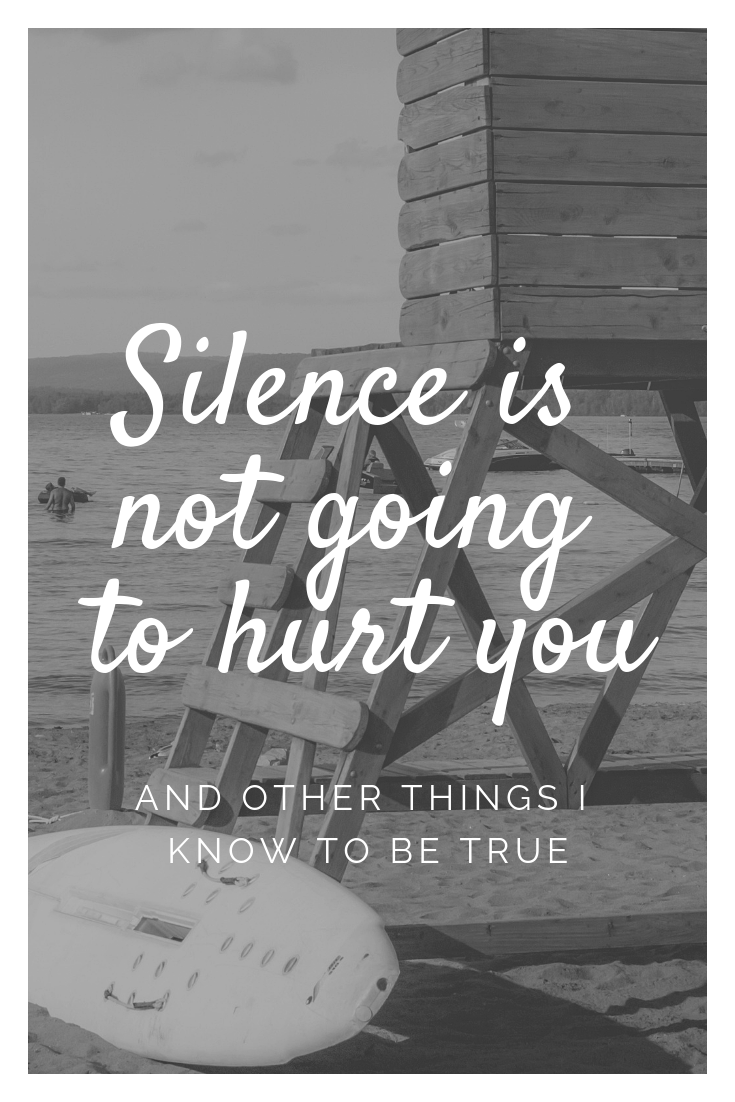Did you know that I wrote a devotional for Advent this year?
So thankful for the opportunity to be the writer for Chalice Press' (the same folks who published my book, Birthed) Partners in Prayer Advent devotion this year.
It was a lot of fun to start with a blank slate back in January and think about what kind of words we'd all need by the time that December rolled around.
I knew so many of us would be weary. I knew so many of would be longing for a new narrative in this crazy world we find ourselves living in. I knew that we'd be searching for fresh glasses to put on-- to see the world differently.
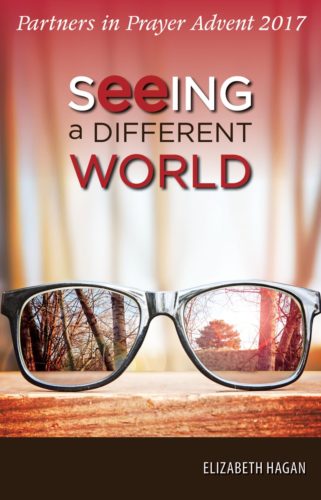 Thus, Seeing a Different World came to be, a devotion for this Advent season sticking close to prophetic texts in Isaiah, Jeremiah and Lamentations, all texts that cause us to stop and see the world as God sees it. It's an opportunity to re-see this December.
Thus, Seeing a Different World came to be, a devotion for this Advent season sticking close to prophetic texts in Isaiah, Jeremiah and Lamentations, all texts that cause us to stop and see the world as God sees it. It's an opportunity to re-see this December.
What's even better about this devotion is that a FREE candlelight service guide is available. You can download it here. It's a service plan for your congregations or for personal reflection time throughout the Advent season. I've heard that Sunday School classes are even using it for their discussions. And at my church, The Palisades Community Church in Washington, DC, we'll be hosting Vesper Services the first three Wednesdays in December following the candlelight service guide. So many possibilities abound.
To give you a preview of what you might find if you order this book here's an expert one devotion you can read in Seeing a Different World taken from Isaiah 32:1–5
The texts of Advent, this one included, remind us that all is not as it should be in this world.
Those appointed to rule over us don’t always lead with righteousness. The wrong people are exalted. We forget the sick, the imprisoned, and the lonely. The rich get richer.
But as much as Isaiah’s words tell us what is not right in the world, they also help us see differently. What is will not always be! Why? God wants US to be part of the change: to open eyes, to invite ears to listen to new conversations, and to open our mouths in ways that include others.
A friend of mine leads a nonprofit organization dedicated to ending homelessness. Her faith compels her to use her education, intellect, and God-given courage to speak for those caught in endless cycles of poverty. Many call the goal of her work unattainable. Yet she’s quick to fire back: If we don’t believe in and work toward the empowerment of all people, who will? Her advocacy shines a bright light into the new world that God wants to create.
It would be easy to write off hope in action as a pie-in-the-sky dream, saying, Well, that’s nice but it’s never going to happen. But as people of faith, God gave us this work!
You can read more by ordering your own copy on Amazon by clicking here.
Or you can order them over at Chalice Press. There's a special deal for bulk orders. (Buy 25 to 249, save 15%, Or buy at least 250, save 25%)
I can't wait to hear what you think as you read! Happy (almost) Advent.
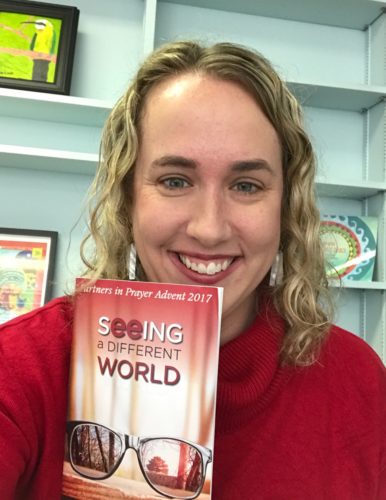
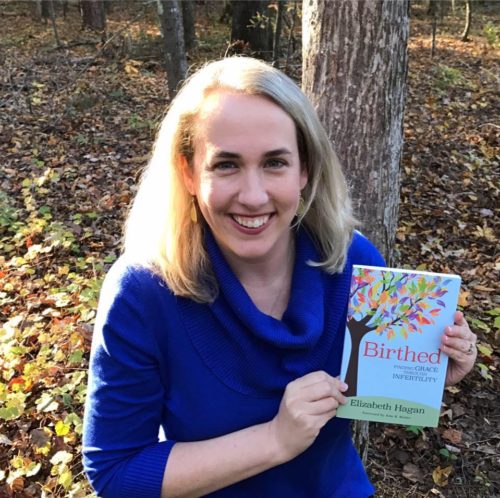 Since I first drafted what became Birthed: Finding Grace Through Infertility back in 2013, I've been on a journey of learning about publishing.
Since I first drafted what became Birthed: Finding Grace Through Infertility back in 2013, I've been on a journey of learning about publishing.
How does it work? What are the secrets (if any) to success? What are the best choices to make as a first time author?
As much as friends or colleagues offer you advice, until you go through the publishing once there are just some aspects of the business you can't understand.
Today, I want to share 5 misconceptions that I've learned through this process:
1.Publication will make you feel like a "real" writer.
I meet folks all the time now who want to talk to me about their idea for publishing a book.
Most of the time, they're good ideas, inspired ideas, the makings of books I'd love to read one day. These folks are serious too. They've drafted chapters. They've written outlines. They're even beginning to think about their target audience and crafting their narrative in that direction.
BUT, they say, "I can't find anyone to publish it." And they look so sad.
Because here's the thing. Writers often equate publication with success. Validation comes with someone "out there" saying our ideas are worthy enough to bind in a book.
Hear me say this, since publishing Birthed, I feel the same as I did pre-Birthed. I continue to blog like I always do. I write for other publications regularly as before. While I'm so glad my memoir was published, I really don't feel like I've suddenly arrived as a writer. I was just taking the next step of who I already was.
(If you have a good idea and completed book-- self-publication is not a bad idea! Don't let publishers define your worth. Go for it!)
2. You make money writing books.
If you go into writing books for the money, be prepared to live on food stamps. Of course, the big box publisher situation is different. But in small publisher land, there's no advances or if there is one it's very small. Additionally, know this: the standard publishing arrangement of what you receive per book you sell is somewhere in the range of $1 a book. Yes, you read me correctly. $1.
When I think about the hours that it takes to produce a quality project-- all of the revising, re-writing and painful meetings with editors, what you're getting is pennies on the hour if that.
This fact can be deflating, but if you're not in it for the money it doesn't feel so bad. My husband always jokes with me when I complain that I'm getting "stars in my crown" since I say that writing is part of my faith calling....
As an aside, be nice to your writing friends-- be willing to pay for their work. Don't expect you'll give them a copy for free. How would you feel about giving away your art for pennies?
3. When your book comes out, publishers send you on a book tour.
Publishers, especially small ones, send you nowhere. It's all you. You organize everything.
Folks have noticed that I've been busy though the past couple of months hosting book signings and events at churches talking about Birthed. Note: all of these engagements I arranged. Many of them came from personal asks. Emails that began like, "Hey, I just published a book, I'd love to come to ...." Others came from invitations of those already invested in my work because they edited drafts or endorsed it. Or mentors who followed my journey and wanted to support me.
Bottom line if you want to have a "book tour" in times like this draw upon your personal connections-- people who will make meaningful events for you happen. If you want to talk to me about visiting you, check out my schedule and send me a message! (See, I'm always looking for ways to make an ask).
4. The more live events you have the more successful your book becomes.
Seems logical, right? Events sell books. So events are good.
Events are good if you enjoy meeting people (which I do!). But books don't always sell at events. Amazon and e-books are powerful pulls especially when you've written a book about a topic that brings people shame, like infertility. Folks want to buy books like these from the comfort of their home.
Furthermore, if you talked to a crowd say of 100, the standard fundraising stats are that 3-5% of those present will respond. Yet, for example, I spoke to a church a couple of weeks ago of about 100 and sold 10 books. I was thrilled. It was great return (though doesn't seem like a lot) than normal.
It's important to mention here that events are costly to put together. You often have to spend money to drive or fly somewhere. You have to stay somewhere. All of this adds up (unless a group is supporting you).
Instead, what IS helpful for marketing though is big name endorsers-- writers/ speakers/ leaders with a bigger platform than you willing to put their nose out and say, "This is a great read because . . . "
5. People will be as excited about your book as you are. 
They won't, sadly. Though of course, some will like your mom . . .
It's important to realize that you've invested so much of your life in every word of your manuscript. You've painfully made the choice over verb tense, chapter headings and what type of table of contents you'll have. You've mulled over the title of the book, the cover design and how to word the description of yourself on the back.
And while you're proud of what you've pulled together (and you should be), just don't expect others to be invested in the details as you have. (Do you hear how many time I've used the word "you?"). It's your baby and as you send it out into world, it's time to let go. Others will respond as they will.
Those who care will surprise you. Those who ignore it will surprise you even more. But, by time you've reached publication, again I'll say it's not yours. Let it be. It will do what it needs to do without you worrying about it so much.
All in all I'm so thankful I published my first book and I hope my publishing career isn't over. I know I have more books in me. And if you have a book in you, let's talk off line. I'm know I have so much more to learn. I want to learn from you.
Let me let you in on a secret. I may seem cool and calm in person. But, when I'm launching something new, I'm a nervous wreck on the inside. For there's nothing scarier than putting yourself out there, putting all your energy or weight behind something and hoping people show up, participate and gain from the experience what you hoped they would.
I believe such fear is a normal part of the world of church ministry.
Pastors are often the movers and shakers of the church, aren't they?
We are the ones who start new things. We are the ones who say to other church leaders: "Trust me. We just need to do this." We are the ones who often plan the sermon series that ruffles some feathers.
And so every Advent or Lent when I've offered a new book study or worship series . . .
Or, every summer that I've thrown out the normal worship practices in exchange for a Sabbatical of sorts . . .
Or every church council meeting, I've offered a new way of thinking about church leadership . . .
I've had a pit in my stomach. That pit that reflects back: "What if ___ is a terrible idea? What is no one shows up? What if I'm the only one who really cares about ____?"
Of course, I could listen to the fear and stop all plans. But, I'm a firm believer that we can't let fear control us, can we? So, with my brave face on, I've set out chairs. I've make flyers. I've invited people to a meeting.
And when all is said and done, usually I'm delightfully surprised.
All is usually well. Or at least I get through the experience (so I can cry about its failure alone at home).
Life is lived well when we put our ideas, our heart on the line, isn't it?
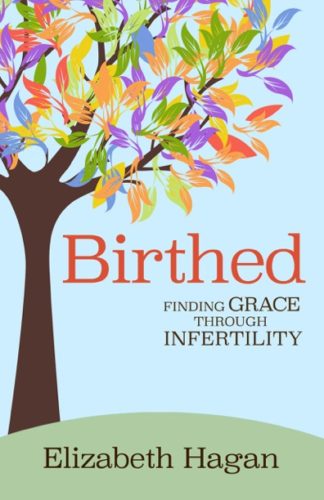 I'm soon offering the world something new, something I've been working on for a long time. Birthed: Finding Grace Through Infertility will soon be available for sale. And I have a PIT in my stomach about it too.
I'm soon offering the world something new, something I've been working on for a long time. Birthed: Finding Grace Through Infertility will soon be available for sale. And I have a PIT in my stomach about it too.
Though I know it's the best writing I could offer readers at the moment it went to print. . .
Though I know it was a writing project God called me to complete . . .
Though I know it has the potential to help readers who've walked through a similar season of pain find hope . .
I'm scared.
And there's part of me that wants to hide out and not come out till the book launch is over.
Because I want you to like it (and I know not everyone will).
Because I want to keep doing this kind of work: living stories, writing stories and sharing them with you (and the number of copies sold of Birthed will have a lot to say about whether or not I can easily keep doing this).
Because my heart is on every page (and it feels so vulnerable to offer the ENTIRE public my heart).
But, my prayer is MAY NOT MY FEAR HOLD ME BACK.
So in faith, I've spent the past weeks planning, organizing and dreaming about book launch events trusting that some of you might want to come. And hoping these events will help me get this book in the hands of those who need it the most.
For the truth is this: the only job I have is to trust the Spirit-- the Spirit who nudged me long ago to write this-- will help Birthed be what it needs to be. All will be well. It really will!
And would you like to read a preview? Head over to my publisher's website, Chalice Press and read what some earlier readers have to say about it and one chapter! Thanks, friends, for being along for the ride.
It's summer and time that many of us start thinking about picking up a good book for a Saturdays at the pool or to dive into over vacations. If this is you, here are 4 thought-provoking non-fiction picks I would add to your list . . . books that might make you think about racism, sexual violence, disabilities or fundamentalism differently.
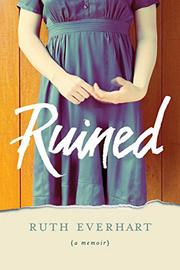 Pre-order now. Will be released on August 2nd. Ruth is a friend of mine from the RevWriting group I participated in from 2012-2015. During that time, I watched Ruth develop, write, and re-write this memoir about her experience of being sexually assaulted while a student at Calvin College and all that came next.
Pre-order now. Will be released on August 2nd. Ruth is a friend of mine from the RevWriting group I participated in from 2012-2015. During that time, I watched Ruth develop, write, and re-write this memoir about her experience of being sexually assaulted while a student at Calvin College and all that came next.
In Ruined, Ruth does not shy away from the hard places of theological shaming, rape, grief and messy vocational callings. From the first chapters I read of this project, I knew Ruth was the real deal. Her command and fluidity of language drew me into her story from the start. Her courage to share her story with such vulnerability pushed me to tell my own. Her willingness to explore theological hard places keep me thinking long after I put her book down. Ruth's story is a one that the church needs because it doesn't shy away from the hard places of life. She tells the truth!
2. Just Mercy: A Story of Justice and Redemption by Bryan Stevenson
Our world needs more angels like Bryan Stevenson and more stories like this one! I literally could not put it down when I started 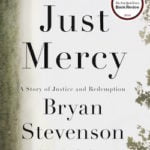 reading it back in April. It was one of those reads where I felt convicted on every page on how much I didn't know that I thought I did about our prison/ justice system in America.
reading it back in April. It was one of those reads where I felt convicted on every page on how much I didn't know that I thought I did about our prison/ justice system in America.
In Just Mercy, we gain a front row of Bryan Stevenson's journey from 23-year-old Harvard Law student encountering prejudge in the criminal system for the first time in the deep south to founder of the Equal Justice Initiative based in Alabama with far reach. This author writes with such clarity and trustworthiness as a narrator that you are just hanging on every word to see what comes of his vast collection of clients. Of special interest is the case of Walter McMillian, a convicted murder on death row-- who we learn is innocent. But the question is will he be released from prison? Though I've heard stories like this for years by colleagues in prison ministry, Just Mercy did something to me. With a softened heart to the cause, I'm ready to act.
3. Unorthodox: the Scandalous Rejection of my Hasidic Roots by Deborah Feldman.
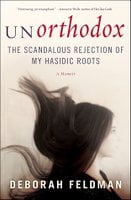 Growing up in a sheltered Christian home, I thought my type of Christians were the only weird ones. But, it isn't true, of course. Fundamentalists are found in every religious tradition. A friend recently introduced me to this memoir of Deborah Feldman saying Unorthodox "is like Jewish version of your life."
Growing up in a sheltered Christian home, I thought my type of Christians were the only weird ones. But, it isn't true, of course. Fundamentalists are found in every religious tradition. A friend recently introduced me to this memoir of Deborah Feldman saying Unorthodox "is like Jewish version of your life."
I was delightfully surprised at what an all-encompassing view Unorthodox gave of what it is really like to grow up as a Hasidic Jew in New York City. We follow her from the days of her bewildering childhood, being raised by her grandparents as a child of a mother who ran away and a father without the mental capacity for child rearing. As much as this author tries to fit in and be a "good girl," one her (especially religious grandfather will approve of) slowly we see her transformation. We see the joy that comes to her from sneaking library books under her mattress. We see the joy that comes as she thinks independently. We see the joy that comes as she makes friends in high school who are also experimenting with the outside world like her. It's quite a journey, this book.
4. Before and After Zachariah by Fern Kupfer
This book might be harder to find in print (written in the 1980s) but it's worth the search if you can find it! The vivid language and emotionally driven plot captivates the heart about of a family's struggle to make peace with the son given to them-- a gift they would have not chosen. This memoir plays out in a quiet Midwestern town through the voice of Fern, the mom, and describes for readers the ups and downs of what it means to birth, raise and make decisions for the care of a severely mentally and physically challenged child. Questions of "When it is it time to institutionalize?" Or "How does a marriage survive such kind of care for another?" Or even "How do you parent a 'normal' child while taking care of such a 'abnormal' one too?" are raised in ways that the reader does not often expect. I was challenged to reconsider how I think about and care for parents and teachers I know who are caring for special needs children.
What are you reading this summer?
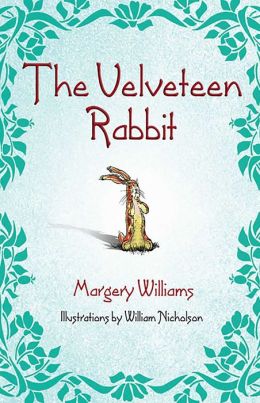 One of my favorite children's books of all times is the Velveteen Rabbit.
One of my favorite children's books of all times is the Velveteen Rabbit.
But like most good children's stories, it's really not a children's story. It's a tale that has important things to say to adults trying to figure out the great question of: "How now shall we live?
The following scenario (that is one of my favorite) is a conversation between the Skin Horse, the most senior member of the children's nursery and Velveteen Rabbit about what is real:
“Real isn't how you are made,' said the Skin Horse. 'It's a thing that happens to you. When a child loves you for a long, long time, not just to play with, but REALLY loves you, then you become Real.'
'Does it hurt?' asked the Rabbit.
'Sometimes,' said the Skin Horse, for he was always truthful. 'When you are Real you don't mind being hurt.'
'Does it happen all at once, like being wound up,' he asked, 'or bit by bit?'
'It doesn't happen all at once,' said the Skin Horse. 'You become. It takes a long time. That's why it doesn't happen often to people who break easily, or have sharp edges, or who have to be carefully kept. Generally, by the time you are Real, most of your hair has been loved off, and your eyes drop out and you get loose in the joints and very shabby. But these things don't matter at all, because once you are Real you can't be ugly, except to people who don't understand.”
― Margery Williams
Many of us think we are real. We think we are living an authentic life.
But, we aren't actually real because our love has cost us nothing. Or it has cost us very little.
We aren't loving till we hurt. And by this I don't mean self-destructive pain. No, I'm talking about heart wide open living.
Think about it: when is the last time you cried tears over the suffering endured by a friend?
When is the last time you prayed for someone longer than a couple of seconds?
When is the last time you picked up the phone to just tell someone "I love you" them and were thinking about them?
Being real is about laying aside selfishness. Being real is about loving extravagantly. Being real is about not being afraid to love, even if you aren't loved equally in return.
But the pain. Oh, the pain. I wish being real did not come with so much pain! But it is does.
When we love deeply, we are also hurt deeply. There is really no way around it. It can feel like--
Friends who we thought would be in our life forever no longer talk to us.
Family members that we thought would always remember our birthdays no longer send us cards.
Colleagues who we thought we would work together with gleefully for years turn on us.
But this is what being real is all about-- having your hair loved off, your eyes popped out and your protective coverings looking sort of shabby. However, in the end, according to the Skin Horse it doesn't matter. We learn as we love that being real is one of life's greatest gifts.And those who can recognize the treasure we are and are becoming will find us. Our hearts will heal eventually. And the storehouse of experiences we've gathered through life's most authentic journeys will make us better people, more loving people.
But I still hate it when my heart breaks. I really do. But, I hope that I am becoming a little more real everyday.
Do you know the website Spiritual Book Club? Check out this site to meet some new bloggers and spiritual thinkers as well as great book recommendations. Several months ago they contacted me for an interview as they are seeking to draw together a diverse collection of people of faith who are actively writing on the web. I thought I might direct your attention there and share part of the interview with you here.
Where you live:Washington DC and Oklahoma City, OK (the juxtaposition of two very different worlds!)
What you do as a vocation or avocation?
a blogger, pastor without a traditional church, social media consultant and global traveler in support of work of Feed The Children.Your two favorite books: An Altar in the World by Barbara Brown Taylor and To Kill a Mockingbird by Harper Lee
Your two favorite songs: "Say" by John Mayer and "Simple Gifts" Shaker Hymn
Why you are interested in spirituality?
I believe that all of life goes back to God. We come from God. We move and have our being in God. Our hearts become restless, as St. Augustine writes until they find rest in God. My life has been shaped, enriched and given greater connectivity as I have paid attention to my own spiritual rhythms.
Keep reading more by clicking here.
 Many of you know about 1) my life dream of publishing a book and 2) that I'm working on one AND currently re-writing my first manuscript.
Many of you know about 1) my life dream of publishing a book and 2) that I'm working on one AND currently re-writing my first manuscript.
The number one question folks ask me when I say I am working on a book is, "When is it going to be published?" Followed by "I want to read it." Which is a nice way of saying, "Hurry up! When are you going to be done?"
While I'm thankful that folks are interested in what I am doing, I have to say that the answer to the question is not so simple as hurrying up. And it's not about my procrastination. I am writing all the time. I've been striving toward all of this for quite some time now-- more than 2 years (hard to believe it has been that long). I've been putting in my 10,000 hours with hopes of getting better at what I do along the way.
But, I am not done.
I want to tell you why: especially in the genre of memoir (which is what this book will be) it takes time for reflections to settle into their proper place on the collection of papers. I am re-writing my manuscript because the way I view the same set of experiences has changed over the last year. I recently came to some real clarity, but that took time. But, if I simply rushed a year ago to get out what I had to offer, it wouldn't have been fair to you (the potential readers) or my story.
Furthermore, the publishing industry is complicated. Sure, there are those who are famous enough to have a publisher ask them to send in a proposal or make them a verbal offer that leads to publication within the year. But I am not one of them.
So, just because you've completed a manuscript, someone in my shoes has not reached the finish line. It's only the start. There's lots of considerations to make in choosing what publishing route to take.
Do you want an agent?
What kind of publishing company do you want to pursue (small, large, well-known, secular, religious, etc)?
Do you want to self-publish?
What is your marketing plan?
All of these decisions are not ones that can be made on the fly because there's a book proposal to write. You write your proposal (or not) depending on how you answer these questions. What is included in a book proposal differs by publisher, but it's usually another 40+ page document that includes an outline, sample chapters, a marketing plan and most of all what makes your book sellable to a particular audience.
Then, once you enter into conversation with publishers, there are key decisions to make like how much are you willing to compromise of your vision based on what the editors think of your work. You also need to start making plans for what will you book launch look like, and what will your media plan be. So, those who say they get a book handed to them on a silver platter are lying or they're really cooler than I could ever be.
Most of all, writing a book is hard work. It's not about the money you will make doing it (unless you are JK Rowling). And it's not all about moment of publication either. It's about perseverance. It's about what you learn about yourself in the process. And it is about feeling so passionate about sharing part of yourself and your ideas with the world that you'll do what it takes to finally see it come together.
#Iamwriting
 It's been over one year now since I left traditional ministry. And folks say to me all the time, "When are you going back to the church?"
It's been over one year now since I left traditional ministry. And folks say to me all the time, "When are you going back to the church?"
I don't know how to answer other than to say that we need to think about the church in new ways.
Why do we always think about church in terms of buildings and ministers with retirement plans and pensions? Why do we always think of church in terms of who is the staff listed on the back of the Sunday morning bulletin?
And no I don't think I am not going back anytime soon to what you mean by church.
These are the facts: a year ago, I left a weekly pulpit, weekly pastoral care responsibilities and ties to one place, but what I gained in this transition myself.
I said it. I gained myself. I still can't believe that I had the courage to make this leap into the unknown last year. I did have a retirement plan with a denominational board. As much as I've always had a rebellious streak, I've always liked following the rules too.
Yet, I know this past year has been a turning point for me. I think 10 or 20 years from now I'll look back on that year when I was 33 as a time when everything changed. Even with the mid-year moaning and groaning and "what am I doing with my life?" depression I went through (for y'all who lived with me through all of this, thank you!), this move into the unknown was and is a great decision.
The longer I live in this new reality, the longer I know I am not alone and there's other ministers out there like me who want to make such a transition too. I'm gaining a new community.
I recently read Anne Lamott's new book, Stitches. And as I read, I was struck by Lamott's narration of how she quit what she called "her last real job" at the age of 21. She said when she stopped working as a writer at a magazine and called it "the moment when I lost my prestige on the fast track."
When I left the church a year ago, this happened to me too, I think. There were even emails that said: "What are you doing? Why don't you settle down and get a new church in Oklahoma?" (As an aside, I have yet been invited to preach anywhere yet in Oklahoma City-- so even if I wanted a new job in the town where my husband resides mostly, there aren't a lot of opportunities). But who really needs a fast track? I'm still wondering.
Lamott goes on to say about her transition to a non-traditional writing life: "I started to get found, to discover who I had been born to be, instead of the impossibly small package, all tied up tightly in myself that I had agreed to be."
Spot on for me too! These days I am learning and re-learning and then learning some more about the minister, the writer and the human being that I am and was created to be. It's wonderful freedom. I now get to dream without some box of what I think other people want me to be holding me back.
And so in all of this settling down to a new kind of life, I knew my blog-- a medium for so much of this kind of heart-felt communication and exchange needed a makeover. So here it is, and here's my stance. I'm not going back. I am a preacher on a plaza.
As a preacher on the plaza, my new website can give you a tour about the ways in which I'd love to connect with you, your church or non-profit.
I think the conversations we've had and will continue to have are a part of creating what doesn't exist for other ministers, writers, dreamers, poets and businesswomen. This is it. We're on the edge of something beautiful. I just know it.
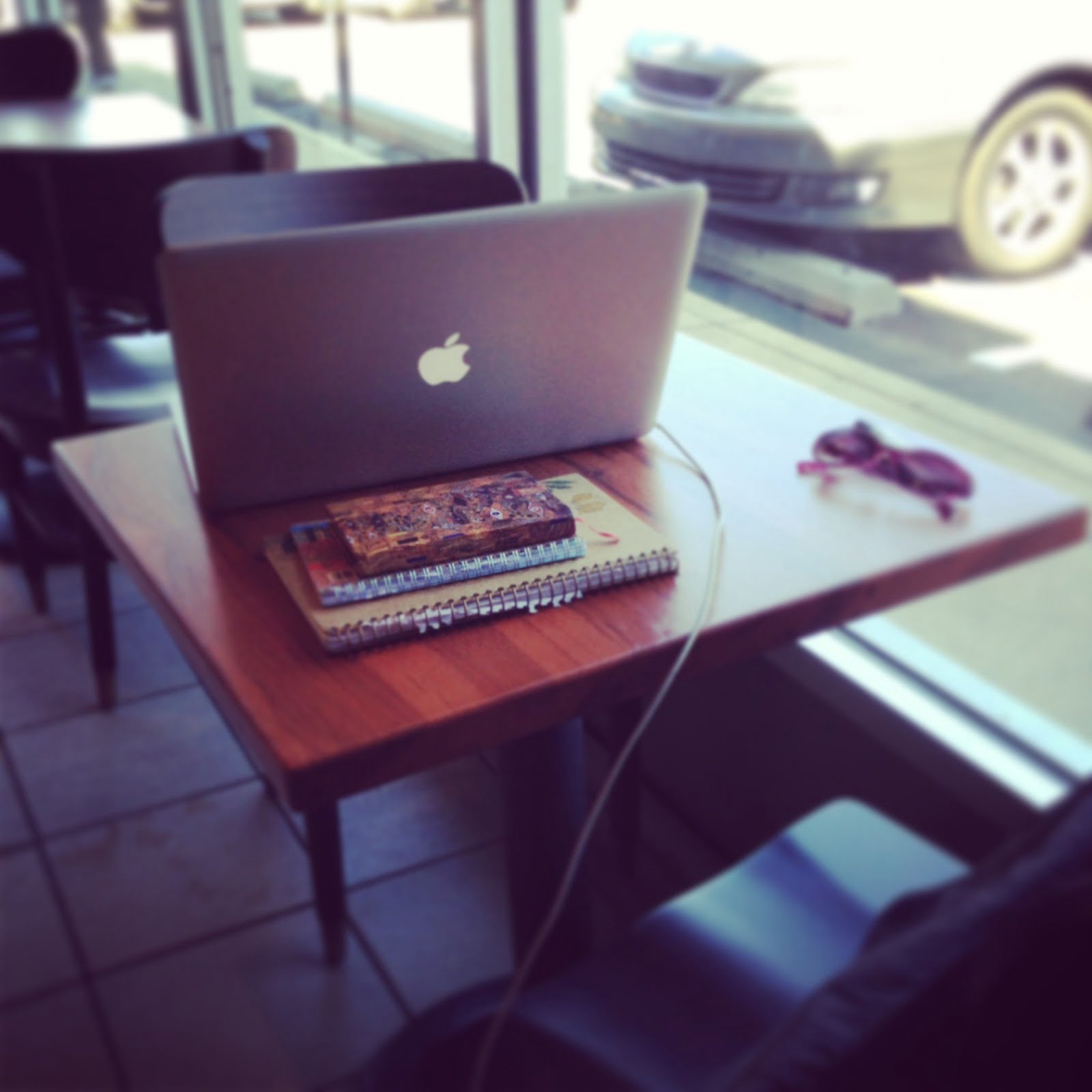 I thought I was done. I really did. I had written a book.
I thought I was done. I really did. I had written a book.
The manuscript that I had been working for almost 2 years had finally reached the stage of the game when it was time to really get serious about publication.
I learned how to write a book proposal (which is no small collection of words!). And, I wrote one. Some publishers were even interested. One was really interested. I knew with a little more attention I'd be on my way to the author track. Visions of my book launch party filled my daydreams with glee.
I was ready to be done with this project. It had taken enough out of me. I had "done my time" putting butt to computer chair.
I was ready for an editor to hold my words in hand and do that thing I'd heard they'd do: tear it a part (to make it better of course).
But then something happened.
I went to Africa-- a land of so much fertile soul filled ground for me.
In November with Feed The Children, I crossed the ocean for another big adventure in Kenya. And one night at dinner when Kevin and I happened to be alone, I just came out with it my stirrings.
"I am not done with this book. I need to start over."
Kevin, knowing his task master wife well, looked at me with eyes of disbelief. "What??"
Yup. I knew in my gut was true. I'd already made the decision to start again.
Not because the details I was seeking to narrate in the story had changed. Or because I suddenly realized I needed a whole new writing style. Or even because I lost the courage to tell the story I started to tell when I began with chapter one.
No, I needed to start over because I didn't write the book I was meant to write.
I needed to re-write the whole manuscript.
Many of the bolts and hinges of the story I wanted to tell were there but the framework and the intent was all off.
I needed write about how pain can be a catalyst for transformation and in particular how relationships can be spiritual tools of such. Parts of the old story would be there but the voice would be altogether different.
But the thing is I am not very good at starting over. Though I feel writing is an art form and so I guess that makes me an artist-- I am not your typical artist type. I don't like open-ended possibilities. I don't like perfectionist driven dragging your feet deadlines. I'm a "getter done" kind of girl even if I post blogs with misspelled words.
And here I am in January, staring at a manuscript that needs new life. How could this have happened?
I'm going to do it though. I'm not going to be afraid to start over. Because this is what I know in my heart of hearts: what I could have offered you would have been good but what I could offer you might just be great. So why not?
#Iamwriting
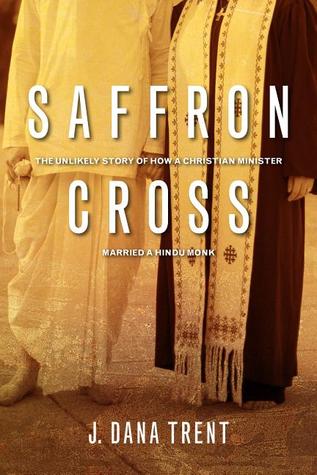 Next week, a dear friend from seminary is hitting an amazing life milestone. J. Dana Trent's first book: Saffron Cross will be released.
Next week, a dear friend from seminary is hitting an amazing life milestone. J. Dana Trent's first book: Saffron Cross will be released.
And I think you should read it. Not just because I know and like Dana as a person, but because I've read it and know you'll love it too.
Saffron Cross is a breath of fresh air to the conversation not only about interfaith marriage but what it means to live in an interfaith society.
With careful attention to not only her experience of Christianity but the Hinduism of her husband, Dana provides a grace-filled memoir of what it looks like to embrace the faith of another not only when it is sexy but also when it is not.
In a culture where it is assumed that 1+1 faith = no faith at all, Dana provides a vivid portrayal of how she and her husband, Fred are forging a new path-- a path rich in mutual learning, compromise, but most of all love for one another's faith experiences.
As you read Saffron Cross not only will you grow alongside the author both in the foundational principles of Christianity and Hinduism-- which Dana Trent does a great job of describing-- but of what deepening a spiritual life looks like in a modern paradigm.
We learn from Dana that just because you are ordained in a tradition, it doesn't mean its faith has yet seeped its way into you.
We learn from Fred that just because you leave a faith tradition for another (as he did with Christianity for Hinduism) it doesn't mean that there is not still much to learn from your roots.
This is a memoir not just for those already involved in interfaith relationships or ministries, but all of us who want to understand how to grow in faith alongside all our neighbors. Because, as Saffron Cross shows us, we are indeed more alike than we are different in our desire for God-- we just have to do the work to see it for ourselves.
In a world where violence occurs over religious affiliation all the time (as happened just last week in Kenya and Pakistan), we need more stories like the ones that the Trent/ Eaker household so willingly shares.
 I don't know how to have faith without gathering gems from spiritual teachers along the way-- especially those in print.
I don't know how to have faith without gathering gems from spiritual teachers along the way-- especially those in print.
Recently I was asked about what were some of my favorite spiritual reads. I thought I’d share some of the books on my list here.
If you are looking for more than a fluff read for an summer beach trip, I’d say check some of these out. Your soul will thank you later.
1. Life Together: The Classic Exploration of Faith in Community by Dietrich Bonhoeffer. It’s a book that is a must read. Truly. Have you ever wondered about how you can truly be both alone and with others at the same time? In this spiritual classic, Bonhoeffer explores what it might mean to life in community in such a way that is true to the New Testament model of the church.
2. Traveling Mercies: Some Thoughts on Faith by Anne Lamott. People either love or hate her, but I find myself in the love category because of her honesty. If you’ve never picked up an Lamott book, check her out . . . you might just find yourself challenged to open your own heart to some honest space.
3. Soul Survivor: How Thirteen Unlikely Mentors Helped My Faith Survive the Church by Philip Yancy: Read this and be challenged by how radical and transformative message of Christ and how Christ meets us in the witness of each other-- folks who are both living and dead. I read this book the summer before I went to seminary and found it to be quite an encouragement to keep on going. (or try Yancy’s What’s So Amazing About Grace?)
4. Amazing Grace: A Vocabulary of Faith by Kathleen Norris. Come explore with Norris the world of religious language and culture through a new lens. You may find yourself liking the word “sanctification” after all. (Or try Dakota: A Spiritual Geography if you are in the mood for a memoir).
5. Life of the Beloved. By Henri Nouwen So many of Nouwen’s works are classics, but this one is especially wonderful as it challenges all of us to reconsider what it might mean to see ourselves as Christ’s beloved— one of the dearly loved children of God which we are. (Or try Inner Voice of Love)
6. Sabbath: Finding Rest, Renewal and Delight in Our Busy Lives by Wayne Muller. Muller provides an interfaith framework for why rest is so important in our lives. We must rest in order to experience God’s presence in our lives. Thoughtful questions end every chapter as a way to bring the conversation home. (Or for busy parents try Sabbath in the Suburbs by MaryAnn McKibben Dana)
7. The Ragamuffin Gospel by Brennan Manning. You just can’t go wrong with Manning—it’s an oldie but a good one. In need of some grace in your life? Manning explores how most of us fail to accept this wonderful aspect of life in Christ. Come explore how God is already smiling on your life no matter how bedraggled, beat-up, or tired you feel.
8. Altar in the World by Barbara Brown Taylor. I can’t help but think that the presence of God is all around us—in our daily work, in our relationships and in our rest. BBT explores paying close attention to the presence God without ever leaving your home ore community. Gems of narrative within to last for a long time.
What classic books would you add to such a list?
 Over the past several months, I found myself with more silent and uninterrupted time than I've ever experienced before in my life.
Over the past several months, I found myself with more silent and uninterrupted time than I've ever experienced before in my life.
After a couple of months of finding myself with more time than I expected, the temptation was to "just do something." To fill the space with more books to read, more coffees to have with new friends and old friends alike, and more trips to take. Maybe start or learn a new hobby? Maybe get a part-time job just for the fun of it? More of something to fill the void of time that used to be offered to the church.
Sure there were things to do like finish my book manuscript which would fulfill my commitment to the Louisville institute, events to attend connected to my husband's job and the usual of keeping up with house chores and the never-ending pile of mail that always seems to need attention on my desk.
But, still even with all of this "doing" there was plenty of silence left. Still there was quiet. Still even with all of the coffee dates and lunches I could muster energy up to attend, there has been just me. Alone. In quiet. Making friends with this state of being called solitude.
There have been days when I've loved it, savoring every minute.
There have been days I counted the minutes until I could go to bed at night.
There have been days when all I wanted was a friend to call and rescue me from the void that is life in my living room alone.
But the silent beat has gone on.
And this is what I've learned: silence, even as much as we all fight it, is not going to kill us. Nope. It hasn't killed me. Well sometimes it might have felt like it would, but it didn't. And I don't think it will.
Silence has been God's great transformational gift that my busybody soul has needed.
One of the authors I read in seminary but have become fascinated with again the past couple of months is Roberta Bondi. I've loved reading her again because of her focus the desert fathers and mothers of the 4th century who retreated to find solitude. And Bondi writes about what made them tick, how they related to their fellow silent pilgrims, and most of all what they learned about prayer as a result.
As I've stuck close to her book, To Pray and To Love again, I've been reminded that the Spirit often does the best work in us when we surrender to the quiet.
Bondi makes a case for such by saying that when the distractions of our lives are stripped away we have no one or no thing to blame for our laziness, our moodiness, our impulses, or our addictions than the brokenness that is within us. In solitude we realize that life is not about our jobs, our families or even our own ambitions for the future.
Rather, life is about us and God. Life is about all of life flowing out of God's great love for us. Life is dance card full of great opportunities designed just for us to soar.
But only in silence would we know this.
Only in silence would we have eyes to see these things.
And, only when we say no to the temptation of adding just one more thing to our plate do we make room for God.
Life filled with God is worth fighting for even as the hours of silence continue on. At least for now.
I imagine I'm coming to emerge from this season with insights I could have not gained any other way!
